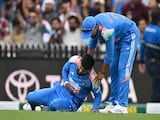Many political pundits believe that Rahul Gandhi is caught between the devil and the deep sea on the question of Hindutva. If he opposes it, then he is damned and if he does not, he is doomed. Now, in a bold move, he has made a scathing attack on Hindutva. While addressing a session of Congress workers in Maharashtra, he tried to emphasise the difference between Hindutva and Hinduism, saying, "Why do Hindus need Hindutva when they follow Hinduism? Is Hinduism about beating a Sikh or Muslim person? No. But Hindutva is. Is Hindutva about killing Akhlaq?"
This statement must be understood in the larger political context. In the last seven years, the BJP and the RSS, through their propaganda, have successfully blurred the lines between Hindutva and Hinduism so that they are understood as virtually interchangeable, and to attack or criticise Hindutva means criticising the Hindu religion per se.
Rahul Gandhi not only differentiates, but also defines Hindutva in terms of violence. Which is rather bold. He says, "I have read the Upanishad and nowhere is it written to kill a man. But I can see it in Hindutva. Our orientation comes from Lord Shiva, Kabir, Guru Nanak to Bapu." Rahul asks a simple question, "If you are a Hindu, why do you need Hindutva? Why do you need this new name?"
Obviously, the BJP and the ruling dispensation moved quickly on a rebuttal. The BJP immediately retorted that Rahul was attacking the Hindu religion. "Rahul has a pathological hatred for Hindus," said BJP spokesperson Sambit Patra.
In the last seven years, the BJP and the RSS have blurred the lines between Hindutva and Hinduism
Why did Rahul choose to frontally attack Hindutva and what will be the political repercussions of his political diatribe? To understand the skepticism about Rahul's move within a section of political analysts as also within the Congress, the present political ecosystem has to be understood.
Since Narendra Modi became Prime Minister, Hindutva has become a hegemonic ideology which has tried to dislodge the left-liberal ideological base of the Indian political system. Hindutva, which once was thought to be socially regressive and backward-looking, has become a reflection and carrier of the dominant political discourse and which, with the conspiratorial support of the mainstream media, has been weaponized to demolish political opponents and silence the voice of dissent. The democratic space has shrunk and to be Hindutva Vadi has become fashionable. A narrative has been built that to criticise Hindutva is politically suicidal and to do would be to take on the RSS and all the advantages it enjoys on its home turf.
Therefore, it was assumed that instead of attacking Hindutva, the Opposition should take up developmental and policy issues to corner the Modi government. It was also understood that to be seen as Hindutva vadi could deliver more political dividends. And so, leaders earlier seen as close to or fraternising with Muslim leaders suddenly changed gears. Opposition leaders raced to prove who was the bigger Hindu. Rahul Gandhi was temple-hopping, Arvind Kejriwal was reciting the Hanuman Chalisa and Mamata Banerjee proclaimed that she was a Brahman woman who performed the Chandipath.
This was tagged political opportunism and they all were criticised for pursuing soft Hindutva. But it does help these parties to neutralise the BJP's vicious campaign to project them as pro-Muslim leaders. It is in this context that Opposition leaders found it difficult to oppose the abrogation of Article 370 and the criminalisation of triple talaq. The riots in northeast Delhi and the Shaheen Bagh movement found muted response from these parties. It was believed that talking about these issues would annoy Hindu voters and embolden the BJP's campaign. The Muslim community felt orphaned.
The BJP is blessed with a very robust organisational machine which has the capacity to, if needed, turn a lie into truth.
But this strategy has a flip side. Hindutva had found for itself a moral high ground. It has been placed as beyond reproach. It was so ironic that the Opposition understood that Hindutva was damaging the basic fabric of the nation but found itself justifying and supporting its prevalence. But how can the Modi government be challenged without attempting to dislodge its main fulcrum? It appears that Rahul Gandhi has realised the logical fallacy of this strategy. But will his move provide beneficial?
The BJP is blessed with a very robust organisational machine which has the capacity to, if needed, turn a lie into truth. It has the unprecedented backing of large sections of the media which can help create any narrative that benefits the party. It is blessed with a charismatic leader who is immensely popular. Therefore, one could argue that Rahul Gandhi's move could boomerang. I don't agree with this thesis. I think He has rightly diagnosed the problem. It is important to realise that India has never faced a situation like this. The country is confronted with a situation in which it has slipped into being an ideological state, and an ideological state and its protagonists can only be fought ideologically. This fight can't be fought in bits and pieces, half-hearted attempts won't lead anywhere. To defeat Modi, Rahul Gandhi and the Opposition must hit at the core of the RSS, that is their ideology, that is Hindutva. A large section of Hindus firmly believes that for India to attain its past glory, Hindutva is essential. Unless people are told and convinced that is a falsehood, they will keep voting for the BJP despite its series of monumental failures. I know it is a risky proposition but then there is no alternative.
Anyway, the Congress has very limited options to position itself as a viable alternative. So Rahul Gandhi has correctly taken a calculated risk. One could argue that given the state of his party today, he has little to lose.
(Ashutosh is Author and Editor, satyahindi.com.)
Disclaimer: The opinions expressed within this article are the personal opinions of the author. The facts and opinions appearing in the article do not reflect the views of NDTV and NDTV does not assume any responsibility or liability for the same.















